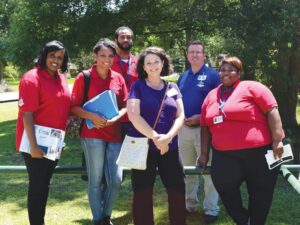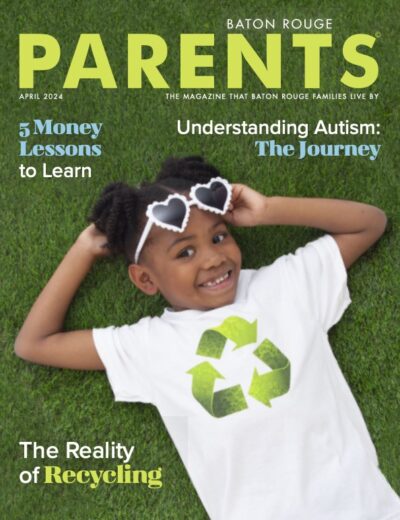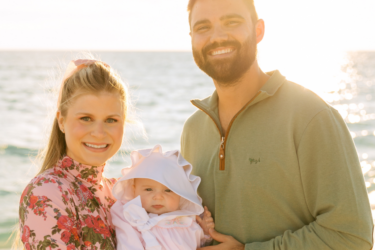
Louisiana Spirit
The summer sunshine gleams off the blacktop road in a neighborhood near Greenwell Springs. FEMA trailers stand in front of vacant houses, and abandoned homes dot the street with cracked windows and tall grass. A team of heroes dressed in red polos walks from property to property, checking in with residents and photographing blighted homes. They carry on conversations about flood survivors and their progress. You may not know their names, but the Louisiana Spirit team members are leading the charge of providing support and hope to the survivors of the Great Flood.
Many Baton Rouge residents are still in the midst of the rebuilding process nearly one year removed from the flood, but they are not forgotten by Louisiana Spirit. Each team member has a specific role, and they fulfill them in perfect harmony.
Louisiana Spirit is a Crisis Counseling Program activated immediately following a presidential declaration of disaster. The organization began after Hurricane Katrina and is funded by FEMA, administered by SAMSHA, and falls under the state’s Department of Health and Office of Behavioral Health. Louisiana Spirit provides adult and child needs assessment, emotional support, and referrals to additional disaster relief services. The program provides linkage with other individuals and agencies that may assist them in their recovery process. Currently, the program is operating in 20 parishes that were affected by the Great Flood.
“We’ve responded to other disasters like Gustav, Ike, and the Deepwater Horizon oil spill. Based on the initial assessment done after the disaster declaration, our services will be activated and boots on the ground in 48 hours,” says Nicole Coarsey, Louisiana Spirit program coordinator. It is critical that Louisiana Spirit continues to offer help to survivors because “after an initial event, you get all these different resources from non-profits and churches, but within six months many have dried up. It’s the job of our local providers and resource linkage coordinators to track down resources for the survivors,” Nicole adds.
On this day of canvassing, the team consisted of Nicole; Shantel Smith, the resource linkage coordinator; Matthew Muse, the team leader; John Nosaka, program director from Capital Area Human Services; Kaneisha Chaney, crisis counselor; and Martine Turner, the program manager of the Capital Area.
Typically, the resource linkage coordinator and crisis counselor canvas together. They always go two at a time, door to door. Kaneisha describes her crisis counselor role, “I hear the story, figure out where I can step in and help them. Then, I pull in our resource linkage coordinator to find resources that we can use to handle the crisis. Sometimes we’ll pass them onto a disaster case manager. We have up to five times we can visit with a survivor.” The initial visit is not the end for Louisiana Spirit team members. And when they walk through a neighborhood, they are not done. They will continue to return until they have met with everyone in the flooded area. “We want to inform survivors of resources we have that they may not know about,” Martine shares.
The Louisiana Spirit team in action looks a little like this. Kaneisha and Matthew enter the trailer of a survivor. They greet him and explain who they are. Then, they ask gentle questions about his experience and current situation. He responds with relief and honesty. After he recounts his flood story, they leave him with multiple handouts full of resources. He is grateful someone cares. This is what Louisiana Spirit does. They stop and listen to those who have experienced crisis. Then, they work to remove any pressure they can, whether that be by providing stress management ideas or linking them to much needed resources.
Martine says her love for this job is founded on the immediate gratification she receives from helping others. At the end of each day, she knows that she has met a need. “People are very receptive and thankful. When they are caught up in trying to get their house rebuilt, they don’t have time. We get a lot of people in tears because they get to the point where they can’t do it all and give up. We will do anything we can to make this process easier and help people see there is a light at the end of the tunnel. When the day ends, I feel like I did something. I come to work every day and I love it.”
Another example of Louisiana Spirit’s impact occurred as the team walked. A truck stopped and a loud “Hey” boomed out of it as Shantel approached. The group thought it may have been a relative or close friend with that type of greeting, but it was a flood survivor she had helped from the Park Forest neighborhood. He glowed as he described how her resources had helped him get his floors installed and his house painted.
The team all agreed that their main job is building rapport and relationships. They are true helpers, community servants who only bring good news. Kaneisha explains, “Rapport helps us help the survivors throughout the whole process. It reminds them that someone from the state level is here and hearing their stories and are in the process with them. They’re not forgotten.”
Remembering all types of survivors is one of Louisiana Spirit’s many purposes. Not only do they walk the devastated streets, but they also get involved in summer camps and schools to work with survivor children. The crisis counselors help children process trauma and stress creatively. First responders and teachers are also on the program’s radar. They offer services to them as well throughout recovery.
The Louisiana Spirit team exudes compassion as they share confident knowledge with survivors. Some of them are survivors themselves and offer empathy to each person they contact.
“Everybody’s story is different. People are dealing with the total destruction of everything they’ve known as stability, and now they’re living with family members or in a trailer. Parents have to rebuild their homes, deal with their kids having trouble with grades or in school, and manage their jobs. The spectrum is so vast. It’s easy to forget if you don’t drive through the areas, but people are still trying to get in their homes. We all have to work together,” Matthew emphasizes. ■





